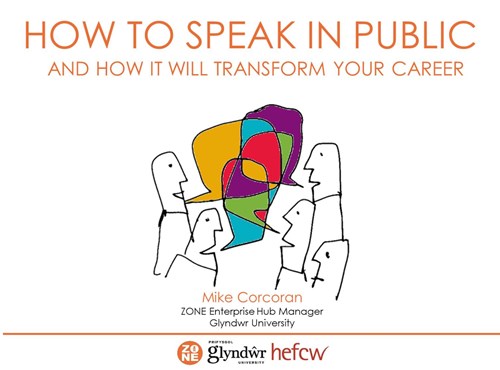Group Size
?
1.) Small group (teams of 4-6)
2.) Individual Task
3.) Large Group
4.) Any
Any
Learning Environment
?
1.) Lecture Theatre
2.) Presentation Space
3.) Carousel Tables (small working group)
4.) Any
5.) Outside
6.) Special
Lecture Theatre, Presentation Space
QAA Enterprise Theme(s)
?
1.) Creativity and Innovation
2.) Opportunity recognition, creation and evaluation
3.) Decision making supported by critical analysis and judgement
4.) Implementation of ideas through leadership and management
5.) Reflection and Action
6.) Interpersonal Skills
7.) Communication and Strategy
5Reflection and Action
7Communication and Strategy
For students of BA Broadcasting, Journalism, and Media Communications at Glyndwr University, skills in public speaking, presenting and communication are absolutely essential. Throughout their academic life students will be required to present work in a wide variety of ways, and in their professional life they will encounter many environments were public speaking is unavoidable. To that end, students studying towards this degree programme are given as many opportunities as possible to develop these skills, in a mixture of real-world and simulated environments.
A two hour session was run for a small group of second year students on the above programme, on the theme of ‘How to Speak in Public.’ The group were of mixed ability and experience, with some working in media jobs (entailing regular presentation and communication) as alongside their study, and other with who’s only experience had come from school, college and University presentations.
The session was delivered by the University’s ZONE Enterprise Hub Manager, on the invitation of the course tutor.
The session followed the format which can be found in the ‘Workshop - How to Speak in Public’ How to Guide.

The students began the session with an introduction to the themes which would be covered, namely; how to structure a presentation, how to use tools effectively; how to present clearly; how to control and manage nerves, and how to deal with questions.
A brief dialogue initiated the session, where students discussed how they felt the subject was relevant to them, their studies and their careers. As the group size was small, it was possible to ask each individual about their own experience, feelings toward public speaking, and careers ambitions at this stage. This entailed that the session was tailored directly to the needs of the individuals there after.
At each stage in the workshop, examples were chosen which were appropriate to the audience in hand, and as the session extended over two hours, it was possible to go into a greater degree of depth at each of the practical activity and discussion opportunities. For example, in discussing the use of appropriate language, each member of the group wrote a short paragraph, communicating the same piece of information for three separate audiences, and then the group each presented these mini-presentations to one another. An in discussing the appropriate use of tone, we used a real world example from one of the audience, who broadcasts her own show on a community radio station.
Again taking advantage of the small group size, the session was informal and conversational in nature, and questions were answered, points of contention debated, and tangents explored wherever appropriate as we progressed.
At the end of the one session, the key themes covered were re-capped, and students were offered the opportunity to ask additional questions, and directed to further support, links and reading if they wished to explore the issues further.
The session had a strong, positive impact on the individuals who participated. For those in the group with some prior experience of presenting, they were able to consolidate what they knew, focus on the finer details of the content, and offer valuable feedback and contributions to the group conversation. For those with limited or no previous experience, it served as a solid foundation to the topic on which to build going forward.
Indeed, following the session, the group sought further support from the enterprise service at the University, in organising and hosting their own contemporary science debate evening, putting many of the skills covered into practice.
Learners reported that the session left them with greater confidence and understanding, and all were keen to put the skills discussed into practice going forward. Feedback from participating students included;
“Really supportive and helpful! Made it interesting.”
”Good dynamic talk with great points and useful information.”
“Enthusiastic presentation which was clear and understandable. Very good!”
“Very good presentation – clear, informative and interesting.”
“Good talk containing a lot of useful and relevant information.”
“Excellent presentation. Really useful.”